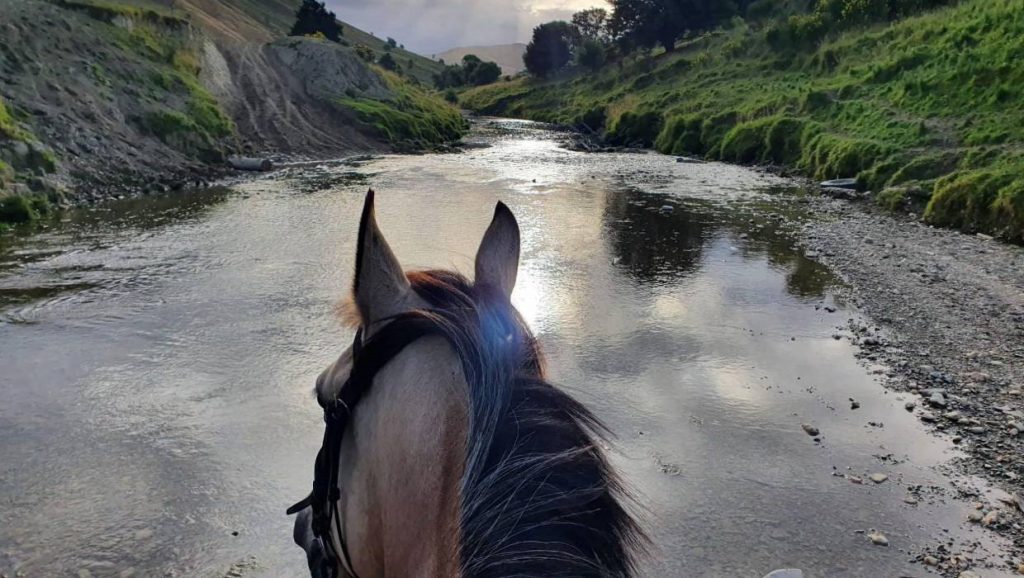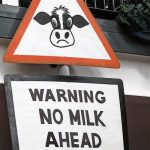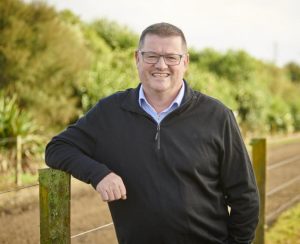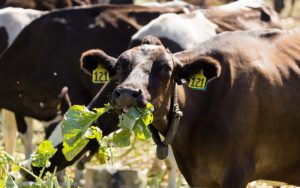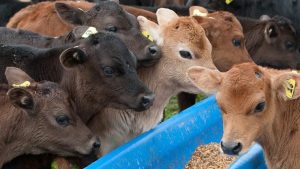
How was a wedge forced between townies and farmers, and what can be done to fix it? Piers Fuller and Warwick Rasmussen report.
Rebecca Harper jumps at the chance to state the case for good farmers around the country.
Within minutes of being contacted, the typically busy mum of one-year-old Phoebe tells the Sunday Star-Times she’ll talk as soon as possible, but she’s on the road right now.
She pulls over to message: “I’m just driving with a horse float and baby, but I’ll be home in an hour.”
Harper has a unique perspective on the rural-urban divide. She’s a sheep and beef farmer, along with husband Richard Greaves at Pongaroa, deep in the heart of the Tararua district.
She also works as a journalist in the agricultural sector, and has a business, TargetPR, which does public relations and marketing work for people and companies in the rural sector.
She feels she’s in a good position to take the pulse of the sector and agrees that many farmers feel like they are under attack, and are fighting a major perception issue that has no easy, quick fix.
“The reality is that farmers perceive that people don’t like them, and that can be hard to take.”
She says its businesses on the fringes, the animal abusers, the polluters that make the most headlines.
The ones that are doing well, who are trusted stewards, improving the land they work on, and caring for their workers and stock will never garner the same amount of attention.
And if the only rural news people in urban communities come across is about the bad buggers, that is obviously going to shape the way they view farming, Harper says.
“I think about a generation ago nearly everyone in New Zealand had some connection with farming. It could be relatives, it could be that kids stayed on a farm in the holidays.
“Whereas now a lot of people have never even been on a farm. That’s a huge shift.”
Harper believes the weakening of that rural-urban connection, which used to mean visitors could see how farmers and farms work, is a big part of the perception problem.
Within the sector farmers are good at sharing their success stories, which can range from environmental improvements, stock management, and technological innovations but that was largely “preaching to the converted”.
But the toughest question to answer is how to spread that message to a mainstream audience.
A little further down the North Island, in Wairarapa, Chris Garland works as a director for business consultancy firm BakerAg.
In September last year he’d had enough and wanted those in powers to listen. So, he penned an open letter to the prime minister, and other ministers, outlining his concerns about the rural sector.
The letter said “morale among our farming clients is now as low now as it was in the Rogernomics years… and during the GFC.”
“The difference in those earlier years, is that farmers still felt valued by the NZ public.”
He then outlined the pressures on farming, from compliance to mental health issues to, in some sectors “a malaise among these farmers that emanates from a sense of worthlessness”.
Environmental concerns around water quality and greenhouse emissions were issues that were taken seriously by farmers, he wrote. “It took 150 years to get to this position. It will take more than five years to achieve environmental sustainability.”
So has anything changes since he sent that letter in September?
“The letter certainly struck a chord with the people who mattered the most, and that was the farmers,” Garland says.
About six weeks after he sent the letter he met with Agriculture Minister Damien O’Connor to make sure he and others were heard.
Garland says while the response was muted he felt that O’Connor and the Government had “modified their language” and had a better understanding about the stresses, strains and expectations placed on farmers.
“In the interim things improved.”
Garland says while the National Party is most often aligned with the rural sector the last government did little by the way for environmental reforms, to take one example.
Then, when the Labour-led coalition came in there was a gear change.
“It was like they were playing catch-up, trying to change the world overnight. Idealism in the way of pragmatism.”
This was most obvious in a legislative sense with the Zero Carbon Bill and the National Policy Statement for Freshwater Management.
“There’s been more legislation in the past 12 months that directly affects farmers than there’s probably been in the past 10 years.”
Garland understands the imperatives of politically making hay while the sun shines – especially in an election year.
“I detect there’s been some subtle and positive changes. Whether they can withstand the lies and deceit around elections, we’ll have to wait and see.”
Part of Garland’s role is to help farmers make their businesses profitable, and having a compliant, sustainable operation wasn’t just a nice thing to do – it makes financial sense.
“If you’re non-compliant, it’s going to get harder and harder to get finance when you need it.”
“Farmers want to feel proud about what they are doing, but many of them haven’t been in the past five years.”
Because of mixed messages, a diminished public perception and layers of regulations farmers “didn’t know what good looked like”.
Garland wants farmers to become better at telling their own stories, a sentiment Harper wholeheartedly agrees with.
Many farmers are conservative by nature, Harper says, not always just in the political sense, but also about singing their own praises.
“For a lot of them it doesn’t come naturally and they’re not really comfortable in that space.
“The best thing they can do is to be positive advocates for what they do. Talk to people about what you do, invite people to your farm.”
Despite the battles on many fronts Harper says the positives far outweigh the negatives.
“We love it and live it and breathe it. It’s a real privilege, and as farmers you’re really personally involved, and because of that you do care what people think of you. We do it because we love it.”
Daniel Eb knew the only way to get people outside farming to better understand, was to invite people in.
So he founded Open Farms, which does it what it says on the label and allows people who are interested to come along, poke their nose in and see how farms are run – but more importantly the people behind them.
Eb says the rural-urban divide is more about perspective than reality and senses an eagerness on both sides to connect.
He says in the past more Kiwis would regularly visit friends and relatives in the country, but as our demographics have evolved, some of those informal connections have been lost.
Pointing to Ministry for Primary Industries’ research in 2017, which showed three out of five urban Kiwis do not regularly visit people in rural areas, he said Open Farms aims to artificially create those connections.
“If 60 per cent of urban Kiwis just aren’t getting out on the farm and have no real understanding of what it takes to say, manage water quality on farm, it becomes very easy to cast blame and they become some sort of nebulous bogyman.”
Starting next month Open Farms has organised family days out on farms across the country, inviting people to “enjoy the land, animals and people that make New Zealand special”.
Eb says the initiative was designed to help urban people bridge the “unhealthy separation from where their food comes from”.
“If there’s a physical place for people to step out of their bubble and reconnect then I think that’s a really good, valuable thing.”
Open Farms is funded by industry promotional organisations, Government and corporate sponsors, but is an independent brand which aims to showcase farms of all types and allow farmers to put their best feet forward.
In tandem dairy giant Fonterra has been running its Open Gates programme for three years and at their most recent event in November 14 families around the country hosted events on their farms.
Spokesman Mike Cronin said it allowed dairy farmers “to show the public where their milk comes from and what our farmers are doing to clean up the waterways, lower their emissions, and maintain the land for generations to come”.
Karen Williams, of Federated Farmers, and her husband Michael are crop, sheep and beef farmers near Carterton.
The ag industry has felt like the whipping boy for a while. Certainly since the last election it’s felt like that.
She says there are efforts being made to educate the wider public and there’s no conspiracy behind it.
“Our focus is on food production, and that is a positive. I think New Zealand has started to forget how essential that is. Where their food comes from and the challenges that go along with that.
“It is very much just hey, this is what we do, you need to understand that most of us do a really good job at it, but some of the negative media has blown up so it looks like most of us don’t do a good job of it and it’s quite the reverse.
She says the maturity in the industry reflects that. Instead of always being defensive, they should be open and put themselves in front of the public.
“What’s the point in being defensive because it looks like we’ve got something to hide. We need to be open and honest and share what we do. Share our aspirations alongside our challenges. There are plenty of challenges, but we’re up for it.”
Williams says though she has not personally felt social resentment toward their profession, she knows that some dairy families come in for some flak in everyday life.
“Dairy farmers and their children have been targeted unfairly and there is bullying in schools.
“That’s really unfortunate and I think we need to push back on that. That is not OK when our conversations become judgmental on your mum and dad’s career choice.”
“We are doing some really awesome stuff on farms. We need to be positive about our industry for so many reasons. We want to attract good staff, we want people to be employed and care about what they do.
“We do care about our environment, we live in it, our animals live in it and our children grow up in it. It’s not our MO to denigrate our environment.”
Williams says the urban view of farmers was often simplistic and they don’t see the advantages of living in tight knit communities. “People rely on stereotypes.
“Those who sit in big cities forget those connections and [the] strong community resilience that exists in the country.
“There are smart people on farms, they’re running big businesses and they’ve got a lot of balls in the air and trying to improve the environment, continue to have an economic return and provide for the welfare of their family and their staff.”
Last September independent research firm UMR surveyed 1000 New Zealanders to find out whether they had positive or negative views toward various agricultural industries.
More than half (54 per cent) had a positive view of the sheep and beef industry with around 12 per cent harbouring negative sentiments toward the sector. Dairy was held in slightly lower regard, with just over half of respondents (51 per cent) thinking positively about it, but one in five holding a negative view.
UMR executive director Marc Elliott says the research was at odds with the perception held by many farmers.
“The strong theme we have heard from farmers in the past is that they do not feel well-liked by their urban counterparts. However, when you poll the general population, this is simply not true.”
Just a few short months ago when Masterton sheep and beef farmer Sully Alsop talked to Stuff he was well and truly over being portrayed as one the bad guys of New Zealand industry.
Though commodity prices were good, the pressures coming from all directions had sucked dry his love of farming. As a former runner-up in New Zealand Young Farmer of Year, Alsop was a sharp operator, but was feeling under siege.
At the time he said: “You feel like the country’s turned their back on you. When you introduce yourself and say ‘Hi, I’m Sully, I’m a farmer’, they treat you like you’re a leper like ‘way to ruin the environment’,” he said.
As agriculture moves with the seasons, so too has Alsop’s view of the public’s perception of the industry.
He thinks New Zealanders are starting to come back around and have more sympathy for the farmer’s lot, but he says policymakers are giving the sector the biggest headache.
“Since then, you’ve realised that the bulk of the country do kind of get it. I think the thing we’re battling with at the moment is whether our friends in Wellington get it.”
“I’d say there’s more of a disconnect there than anything.”
Alsop too believes the cultural divide is as much about perspective and demographics have influenced the make-up of urban versus rural.
“Statistics would say you’ve got a far less chance being associated through a family member based on a farm than there was 30 years ago.”
He says education campaigns might help reduce people’s ignorance of farm life.
“I’m very ignorant of what happens in the middle of Auckland for the same reasons as someone from there might be quite ignorant of what happens on my farm.”
THE LAY OF THE LAND
Exports in primary industries (which includes dairy, meat and wool, forestry, horticulture, and seafood) were expected to be worth about $47.8 billion in revenue to the year ending in June 2020. Dairy export revenue is forecast to account for $19.6 billion of that (up 8.4 per cent on the year before).
Meat and wool export forecasts are at $10.4 billion (up 2.5 per cent) over the same time period. Forestry’s $6 billion forecast is significantly down (12.8 per cent) following a year of record highs.
Horticulture revenue, which includes kiwifruit, apples, pears, and wine, is expected to bump up about 4.7 per cent to $6.4 billion, which would push the horticulture sector to third place, ahead of forestry.
Seafood export earnings are forecast to grow 6.5 per cent to $2.1 billion, the first time annual export earnings in that area will pass the $2 billion mark.
Source: MPI Situation and Outlook for Primary Industries report 2019
